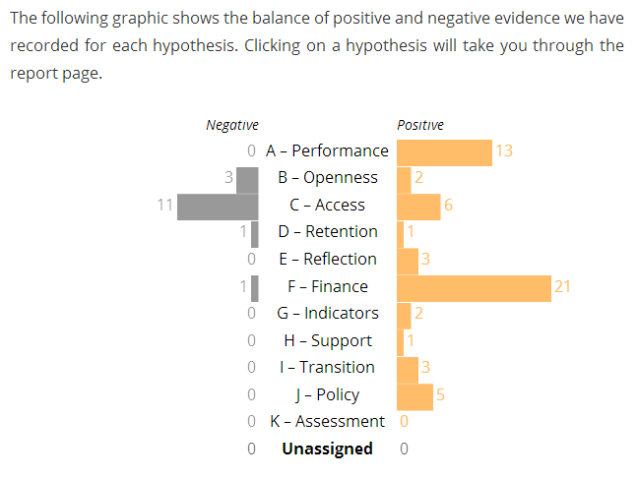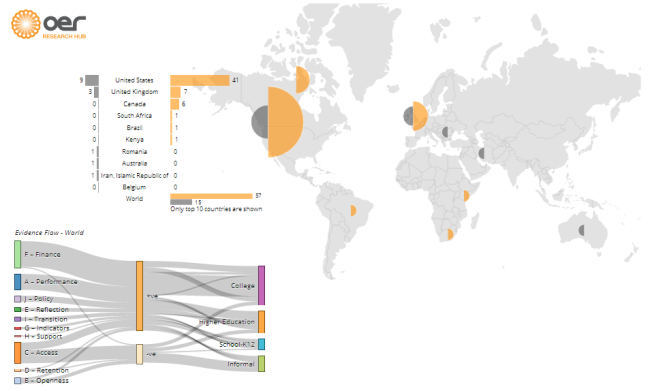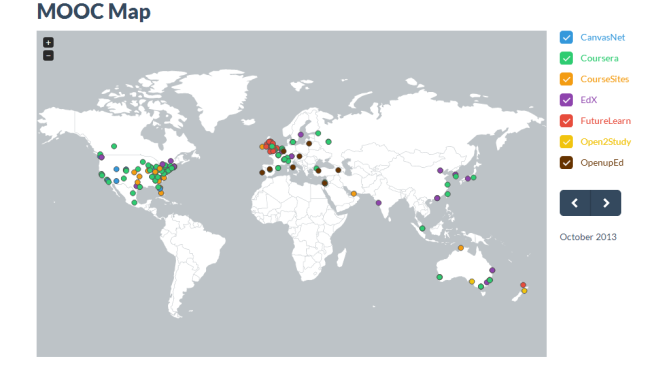As the 3 year UKOER drew to a close and the final evaluation of the HEFCE funded intervention in OER was published (McGill et al, 2013), what lessons have been learnt and how do they compare with the current findings of the OER research Hub?
It was difficult to identify just 3 key issues with OERs as there are so many models and perspectives that the learning objects could be viewed from, with each model producing a different perspective on the overall impact of OERs; be this good or bad. However, the OER Research Hub is starting to produce more polarised reports focused around three main topics and it is these I shall concentrate on.

- Learner Performance – The OER Research Hub identifies OERs having a positive impact on learner performance and satisfaction; this being mainly composed of the views of educators and less so of their students. Whereas this does not feature within the top 3 benefits of encouraging and releasing OERs within the HEFCE review impact summary. However, there does seem to be a positive correlation between the production of OERs and pedagogy, which in turn should favour learner performance and satisfaction.
- Access – Although this is a fundamental aspect of Open Educational Practice (OEP) it does not appear that OERs are having a significant impact on opening access to education for the most disadvantaged world populations. The HEFCE review impact summary states that 55% of their respondents identified this a top benefit yet the OER Research Hub maps clearly show that most of the creation and usage activity takes place in the US and Europe, with little creation or usage taking place elsewhere.
Even with all the funding and the significant institution-wide engagement, awareness around OER and OEP outside projects is still fairly limited.
(McGill et al, 2013)
One of the hypotheses poses was – would MOOC activity be any different? So far, this doesn’t seem to be the case, the world MOOC map shows that apart from some minor activity around China and Australia, it seems again that the predominant creators and users are the US and Europe.

 3. Finance – With the introduction of open books and open journals (Open Access) it was envisaged that institutions and students would see considerable financial savings. The HEFCE review impact summary states that 41% of their survey respondents believed that OERs would increase sharing between educators in the same discipline and the OER Research Hub reports a high number of positive reports on financial benefits. However, much of the evidence of financial savings is anecdotal. It is true to say that students have used open books and journals without detriment to their studies but institutions cannot say for certain that open access has reduced costs.
3. Finance – With the introduction of open books and open journals (Open Access) it was envisaged that institutions and students would see considerable financial savings. The HEFCE review impact summary states that 41% of their survey respondents believed that OERs would increase sharing between educators in the same discipline and the OER Research Hub reports a high number of positive reports on financial benefits. However, much of the evidence of financial savings is anecdotal. It is true to say that students have used open books and journals without detriment to their studies but institutions cannot say for certain that open access has reduced costs.
In summary, the findings so far are disappointing, with no clear evidence (after several years of projects) of a positive impact on teaching and learning. It could be said that those stakeholders involved directly with projects have found a renewed interest in pedagogical approaches, however, the real benefits should be measured on the impact on teaching and learning. Taking the HEFCE e-Learning Strategy document (HEFCE, 2009) indicators as benchmarks for measuring the impact of innovations on teaching and learning, it is still questionable how much of an impact OERs have had on these benchmarks:
- INCREASING FLEXIBILITY AND ACCESS
- INCREASING STUDENT ENGAGEMENT
- IMPROVING ASSESSMENT AND FEEDBACK DEVELOPING SKILLS
- REINFORCEMENT OR REVISION
- PROMOTING REFLECTION UPON LEARNING AND PERSONAL DEVELOPMENT
- SUPPORTING INTERACTION WITH PEERS AND COLLABORATIVE WORK
- STRENGTHENING THE LINKS BETWEEN THEORETICAL AND PRACTICAL ASPECTS
- PREPARING STUDENTS FOR THEIR CAREERS/PROFESSIONAL LIFE
McGill, L., Falconer, I., Dempster, J.A., Littlejohn, A. and Beetham, H. (2013) Journeys to Open Educational Practice: UKOER/SCORE Review Final Report, London, JISC. Also available online at https://oersynth.pbworks.com/w/page/60338879/HEFCE-OER-Review-Final-Report (accessed 24 March 2014).
Filed under: e-futures, Pedagogy | Tagged: Evaluation, MOOCs, OER |



Reblogged this on and commented:
OER Research Hub has been blogged on Learning About eLearning…
LikeLike
Reblogged this on LB-H817 and commented:
OER by Paula!
LikeLike
Reblogged this on Il Blog di Tino Soudaz 2.0 ( un pochino).
LikeLike
Reblogged this on eLearning and innovation and commented:
A great post Paula.
LikeLike
Hi Paula – I think it’s worth pointing out that you accessed the map at a very early stage of population – there’s lots more going on there now. But I would tend to agree that claims about OER massively improving access to education in meaningful ways tend to be a bit inflated… especially when it comes to MOOC.
LikeLike
Your blog is very informative. Thank you for sharing
LikeLike